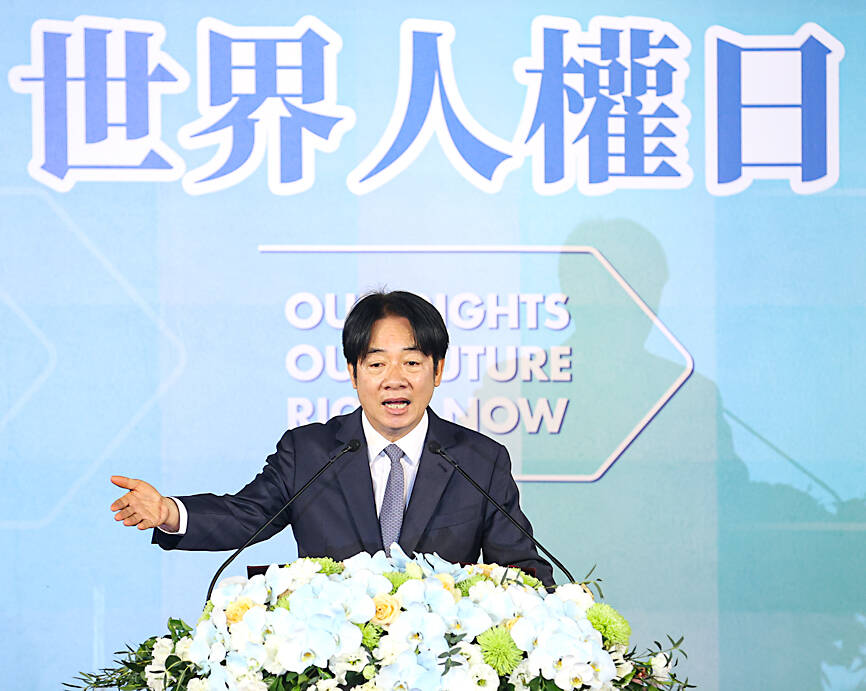President William Lai (賴清德) yesterday said that Taiwanese society had endured decades of harsh martial law and that such “historic mistakes” should never be repeated.
“Taiwan had 38 years of martial law rule, during which its social and economic [development] ... was greatly impacted, and such harm has continued to affect today’s society,” Lai said, referring to the Martial Law period from 1949 to 1987.
The imposition of martial law — the second-longest ever imposed by a regime in history — largely coincided with the White Terror, an era of political repression in Taiwan by the one-party state Chinese Nationalist Party (KMT) government from 1949 to 1992.

Photo: CNA
We must “learn from the lessons” and “must never repeat the historic mistakes,” Lai said at an event at the Jing-Mei White Terror Memorial Park (景美白色恐佈紀念園區) in New Taipei City marking International Human Rights Day, which is observed annually on Dec. 10.
He pledged to continue promoting transitional justice, focusing on restoring the truth about past state wrongdoing and “help[ing] the public understand the nature of authoritarian rule.”
Upholding democracy, freedom and human rights has allowed Taiwan to build connections with other countries, he said, adding that “we must unite ourselves and collaborate to preserve” these values.
Lai’s remarks came days after a social media post by the Democratic Progressive Party (DPP) caucus was accused of sympathizing with South Korean President Yoon Suk-yeol’s imposition of emergency martial law on Tuesday night.
The post repeated some of Yoon’s accusations and justifications behind the declaration, which sent shockwaves through South Korea and the world, including allegations that the South Korean parliament had been “manipulated by North Korean forces.”
The DPP post was deleted about 20 minutes after it was published and was replaced with another saying the previous one “only shared international information and compared it with the domestic political situation, and [the post] absolutely did not mean support for martial law.”
The KMT has criticized the statement and called on Lai, who chairs the DPP, to apologize and clarify his position.
However, the KMT also got into hot water when KMT Legislator Sra Kacaw in the legislature on Friday said that the KMT’s imposition of martial law in 1949 was meant to “protect Taiwan” from possible attacks by Chinese Communist Party forces.

Conflict with Taiwan could leave China with “massive economic disruption, catastrophic military losses, significant social unrest, and devastating sanctions,” a US think tank said in a report released on Monday. The German Marshall Fund released a report titled If China Attacks Taiwan: The Consequences for China of “Minor Conflict” and “Major War” Scenarios. The report details the “massive” economic, military, social and international costs to China in the event of a minor conflict or major war with Taiwan, estimating that the Chinese People’s Liberation Army (PLA) could sustain losses of more than half of its active-duty ground forces, including 100,000 troops. Understanding Chinese

The Ministry of Foreign Affairs (MOFA) yesterday said it is closely monitoring developments in Venezuela, and would continue to cooperate with democratic allies and work together for regional and global security, stability, and prosperity. The remarks came after the US on Saturday launched a series of airstrikes in Venezuela and kidnapped Venezuelan President Nicolas Maduro, who was later flown to New York along with his wife. The pair face US charges related to drug trafficking and alleged cooperation with gangs designated as terrorist organizations. Maduro has denied the allegations. The ministry said that it is closely monitoring the political and economic situation

UNRELENTING: China attempted cyberattacks on Taiwan’s critical infrastructure 2.63 million times per day last year, up from 1.23 million in 2023, the NSB said China’s cyberarmy has long engaged in cyberattacks against Taiwan’s critical infrastructure, employing diverse and evolving tactics, the National Security Bureau (NSB) said yesterday, adding that cyberattacks on critical energy infrastructure last year increased 10-fold compared with the previous year. The NSB yesterday released a report titled Analysis on China’s Cyber Threats to Taiwan’s Critical Infrastructure in 2025, outlining the number of cyberattacks, major tactics and hacker groups. Taiwan’s national intelligence community identified a large number of cybersecurity incidents last year, the bureau said in a statement. China’s cyberarmy last year launched an average of 2.63 million intrusion attempts per day targeting Taiwan’s critical

‘SLICING METHOD’: In the event of a blockade, the China Coast Guard would intercept Taiwanese ships while its navy would seek to deter foreign intervention China’s military drills around Taiwan this week signaled potential strategies to cut the nation off from energy supplies and foreign military assistance, a US think tank report said. The Chinese People’s Liberation Army (PLA) conducted what it called “Justice Mission 2025” exercises from Monday to Tuesday in five maritime zones and airspace around Taiwan, calling them a warning to “Taiwanese independence” forces. In a report released on Wednesday, the Institute for the Study of War said the exercises effectively simulated blocking shipping routes to major port cities, including Kaohsiung, Keelung and Hualien. Taiwan would be highly vulnerable under such a blockade, because it